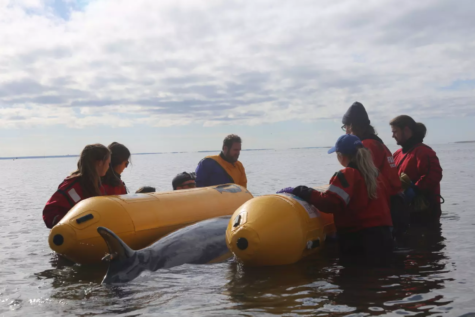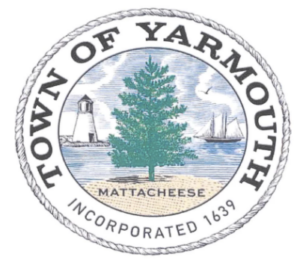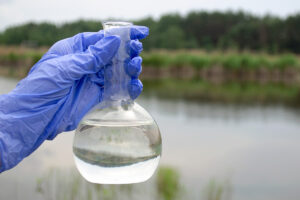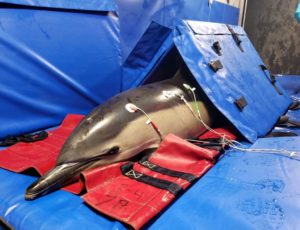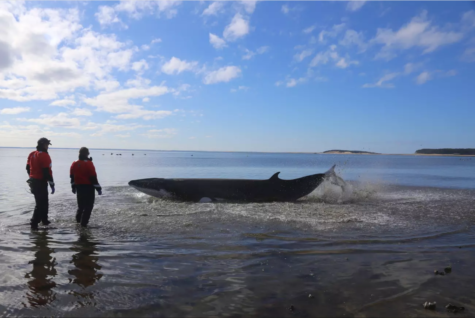
IFAW’s Marine Mammal Rescue Team carefully approaches a stranded minke whale. Photo courtesy of IFAW
As an emergency marine mammal veterinarian, it’s never good when my cellphone starts ringing early in the morning. Is it an entangled seal? A group of stranded dolphins? On November 7th, 2017, this wake-up call was a little more unusual – a live stranded minke whale! I dashed out the door to meet the rest of our team to gather our specialized equipment and head out to the whale as quickly as possible.
When we arrived at the beach in Wellfleet, the tide had started to come back in and the minke whale was resting in just a few inches of sparkling calm water. After gearing up in my drysuit, I waded out in the shallow water to carefully approach the animal and start a physical examination. As I approached, the whale immediately started a swimming-like motion with its tail, indicating to me that he very much knew that I was coming close – a good initial sign. The whale calmed down enough for me to safely approach and conduct my full evaluation. All his reflexes were very much intact and his body condition was good, indicating fairly recent feeding and lower likelihood of chronic illness. His breathing was steady and strong, but the whale was lifting his head with each breath, signifying the great effort it took for this simple and essential act.
Our team moved efficiently and silently around the animal to minimize any stress we were causing him. I drew a blood sample from his dorsal fin and our team analyzed the blood in our mobile veterinary lab on site. After the thorough assessment, we determined that this whale was healthy and likely just in the wrong place at the wrong time when the tided receded – as is the case with so many smaller dolphins that strand in Wellfleet Harbor because of its hook-like shape and extreme tides.
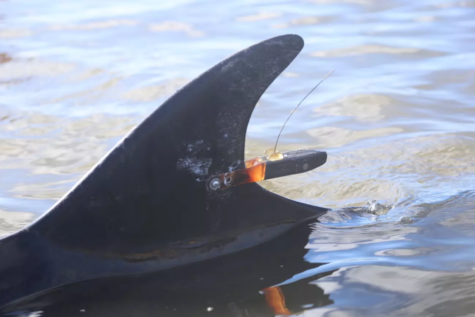
Before release, the team places a satellite tracking tag on the whale so his movement could be monitored over the next month. Photo courtesy of IFAW
Whale rescue is not exactly an easy or formulaic operation. Every situation is different. Every animal is different. It takes a team of highly experienced personnel to ensure that the rescue is conducted in a way that does not put the whale in even more danger than it was already. And unfortunately, for many stranded large whales, rescue is not an option either because they are too sick to survive after release or simply due to the logistical challenge of trying to save an animal that weighs more than a tractor trailer. But our team is constantly trying to push the envelope on marine mammal rescue – what is possible and how do we ensure that we are doing our very best for these animals?
Luckily for this small healthy whale (just the weight of an SUV) the water was rushing in beneath him and we were ready with our pontoons to help lift him back into the sea. Before we did that though, we wanted to ensure that we could track the whale’s survival following release – not only to evaluate whether or not we made the right decision for him, but also to help inform our rescue operations in the future. We attached a small temporary satellite tag to his dorsal fin that would track his location for the next three months. With the right team in place, making sure everyone was being as safe as possible, we re-floated the whale and towed him out of the harbor to deeper water.
Typically, this is where a stranding story ends. But thanks to the tag, we know that this whale made an amazing journey down towards Turks and Caicos in the Caribbean and then he rode the Gulf Stream back up the east coast of the US to the waters off New York before the tag’s battery life ended. Over a total of 83 days, this little whale travelled essentially the distance from London to Hawaii! Indeed, this early morning call turned into quite the adventure since this turned out to be the first ever rescued minke whale that was satellite tagged and released after stranding! Another first for our team who strives every day to innovate new ways to help marine mammals in distress.
By Dr. Sarah Sharp, Animal Rescue Veterinarian – Article appeared on IFAW’s Website




